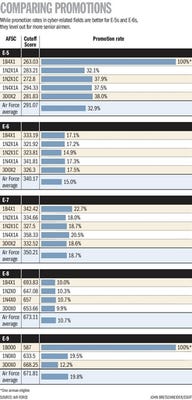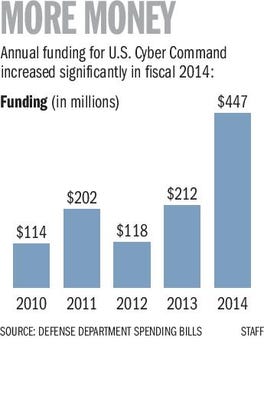Cyber is the new "it" job.
The cyber training pipeline has doubled in three years, big bonuses are offered to some related specialties and U.S. Cyber Command's budget doubled to $447 million in 2014, in stark contrast to the looming threat of retiring entire fleets of aircraft and involuntarily separating thousands of airmen.
In the three years since the Air Force's arm of U.S. Cyber Command — officially called 24th Air Force — became operational, the numbered command has grown to 5,400 airmen, civilians and contractor personnel providing around-the-clock support to protect and defend Defense Department networks. Another 11,000 Air Force reservists and Air National Guard members support the mission.
And there's no sign of the growth letting up.
The Air Force is looking for 1,715 airmen to move to joint Cyber Mission Force teams, operated under U.S. Cyber Command, by fiscal 2016, in addition to supporting the continuing needs of the Air Force, said Maj. Gen. James McLaughlin, commander of 24th Air Force at Joint Base San Antonio-Lackland, Texas.
"I expect to see cyber operators — both enlisted and officers — kept as a high-priority during this force shaping," McLaughlin said in an interview with Air Force Times. "I can't say there will be zero impact, but I think if you're in this career field today, that you are less at risk for any type of force shaping than perhaps others in other career fields."

The Cyber Mission Force
The Air Force is dedicating 1,715 cyber defense operators to the USCYBERCOM Cyber Mission Force and another 500 support personnel as part of a larger Defense Department-wide initiative to recruit 6,000 personnel to be part of 133 teams from all the services. The selection process began last year.The first 451 airmen came directly from 24th Air Force and the Air Force's Intelligence, Surveillance and Reconnaissance commands, McLaughlin said.
Those airmen included 17D officers, 1B4 cyber defense operators, 3D0X2 cyber systems operators and 1N2X intelligence airmen, said Christine Millette, spokeswoman for 24th Air Force, which falls under Air Force Space Command.
"As the mission matures, USCYBERCOM will continue to identify mission requirements, and [Air Force headquarters] and Air Force Space Command leadership will determine the appropriate AFSCs and requisite skill sets to fill those requirements," Millette said.
The other 1,200-plus who will be part of the first teams will come from a variety of Air Force Specialty Codes that McLaughlin said "were maybe considered a lesser priority in the current environment."
Of the 1,715 positions from the Air Force, approximately 80 percent are military and 20 percent are civilian. The military positions are roughly 90 percent enlisted airmen and 10 percent officers.

Training more airmen
Setting yourself up for a career in cyber takes initiative. Only airmen who have obtained the CompTIA Security+ certification will be considered for cross-training into cyber-related jobs. They also must have an understanding of and aptitude for TCP/IP protocols, network hardware and the Linux operating system, Millette said. Airmen can find help with this on the Air Force's free e-Learning system, she said.The next step is to try for one of the growing number of training slots. This year alone, the Air Force has 3,200 retraining slots for cyber-related jobs, and 155 remain, said Air Force spokeswoman Rose Richeson. The Air Force has not yet decided how many retraining slots will be offered next year, she said.
The Air Force has put more than 11,500 enlisted airmen and officers through cyber-related training since 2011. In 2013, for example, 20 percent more airmen trained for 3D1X2 than the previous year. Overall, 300 more airmen were trained in nine cyber-related enlisted specialties in 2013 than in 2012. Training for the 17D cyberspace operations officers climbed 28 percent in 2013.
That trend is expected to continue, McLaughlin said.
"We're not creating new training, we're already using training that's existed across the department, but now we're identifying new strides we need to make to increase the throughput by fiscal '16," he said. "This is a major task across the Air Force. We need to identify these people — especially the new guys — get them assigned, into training, through training and then they have to show up at these new teams [under USCYBERCOM] that are just starting to form."
The training begins with a 23-week undergraduate cyber training course for officers and a 17-week cyber defense operations course for enlisted personnel at Keesler Air Force Base, Miss.
Airmen take a set block of classes such as mobile, space and satellite networking, cyber network threats and defense, cyber operations and information technology fundamentals, and even classes on laws and ethics practices.
As of fiscal 2013, the graduation rate for those going through the officer undergraduate cyber training course is 92.5 percent; and for enlisted airmen in the cyberspace defense operator training course, 88 percent, according to Air Education and Training Command's 333rd Training Squadron public affairs office.
For some airmen, that first phase of training may be enough to land them their first assignment.
Those going through undergraduate and/or cyber defense training "are also just personnel members who are going to work for the Air Force either at an assigned base ... or in some sort of cyber-related role," McLaughlin said. "We have lots of other cyber-related activities, and our training meets those requirements as well," he said.
Airmen are trained to a "joint standard" so they can be assigned to Air Force-specific or joint missions, Millette said.
Airmen expected to be part of the USCYBERCOM teams must take an additional nine-week intermediate network warfare training course at Hurlburt Field, Fla. That phase provides more hands-on training.

Job security & cash
One of the biggest draws to an Air Force cyber career may be the offer of stability while the Air Force is preparing for dramatic force reduction. As some career fields face losing up to 15 percent of their personnel, most cyber-related specialties are holding steady or losing airmen at a lower rate.Two career fields in particular — 1B4X1 cyber defense operators and 1N4X1A intelligence airmen — are among just 10 specialties still eligible for re-enlistment bonuses in 2014. They join the traditionally high-demand specialties such as pararescue and combat control.
And the bonuses are hefty: A staff sergeant in one of those two specialties with six years in, for example, would snag re-enlistment bonuses of $40,000 to $55,000 for a four-year commitment.
Those same specialties are not subject to force reductions in progress this year, according to data provided by the Air Force. They also were on the retraining list for noncommissioned officers released in June and did not lose any slots when the Air Force revised the retraining openings in December.
But the movement to boost the pool of airmen in cyber-related fields is a delicate balance.
"We're trying to increase capacity to such a degree to get this large bow-wave of airmen and personnel through this training that we might be over what we need," McLaughlin said. "Right now, as we continue to move in this mission, you may see us have airmen in an extra capacity going through training. But if we need to reduce, this is only on the training side, not on the operators' side."
But airmen who choose to leave active duty may find growing opportunities in the Air National Guard and Air Force Reserve, McLaughlin said.
3- to 4-year assignments
The Air Force will determine how long cyber airmen in operating roles will be in their assignment, but it's not uncommon that these operators will be in their initial assignment "for about three or four years," McLaughlin said.While planning is still being discussed as to where these airmen will physically be stationed, most on the Cyber Mission Force will be in San Antonio, and at USCYBERCOM headquarters outside Washington, D.C.
However, the teams are looking to expand to seven or eight locations, which is "looking likely," McLaughlin said. "We need to look at facilities that would be able to host them, or if we would need to look at building new facilities to host them," he said.
Airmen in Air Force-specific cyber roles will more than likely defend networks in their combatant commands.
"For example, within 24th Air Force specifically, we have people [as far as] Germany, in Hawaii ... but what we're finding, however, with the beauty of cyber, you can sit anywhere, and just need to be connected to the network, so there is flexibility," McLaughlin said.
Airmen and personnel headed to the Cyber Mission Force will have already showed a prominent skill set and aptitude needed to further train under their specific cyber team as needed, McLaughlin said.
"In this area, this isn't a full sprint. You've got to build the capacity needed in the Air Force and beyond that," McLaughlin said.
Civilian jobs await
The U.S. military may not be able to offer private-sector salaries, but it has other incentives to recruit highly skilled people for the cyber defense mission, retired Air Force Gen. Michael Hayden said."We have advantages that we use, and one of them is very interesting work and very sophisticated work very early on in a career," Hayden, who headed both the CIA and National Security Agency, said in a Jan. 16 interview. "Even though you can't match the private sector in payment, you give a new recruit a fair wage, but also give them access to challenges and equipment — hardware and software — they could not possibly get anywhere else."
It's a coveted assignment outside the military, too.
"[Cyber] is one of the fastest growing career fields in both warfare and the general economy," said Peter Singer, author of "Cybersecurity and Cyberwar: What Everyone Needs to Know," and director of the Center for 21st Century Security and Intelligence at The Brookings Institution. "Look at the defense and aerospace industry, for example. Fifteen percent of all acquisitions and mergers have been cyber ones. More people are also working in the Fort Meade [Md.] complex than in the Pentagon ... think about that for a minute. There's a huge demand for the 'it crowd' or IT service."
And the cyberspace degree program at the Community College of the Air Force offers airmen credit toward certifications that will go a long way in helping airmen land jobs, including the big one: Certified Information Systems Security Professional.
Salaries for people with the CISSP range from $72,000 to $147,000 per year, depending on geographic region, according to the Academy of Computer Education, a professional computer training organization.
In addition to CompTIA Security+, other certifications important to Air Force cyber operations and to other government partners and industry include CompTIA Network+, and SANS Global Information Assurance Certifications.
Whether you are a general in Cyber Command or in the Air Force, or are an executive at a big corporation, cyber is now a part of your duties whether you are directly working as a cyber operative or not, Singer said. "If you use the Internet, there are now cyber threats and cyber responsibilities that [we] need to be far more aware of than we are right now," he said.
"The fact is, the more experience that you gain from the Air Force and being on the frontlines of defense, translate immediately into a job at a later time," said retired Air Force Lt. Gen. Harry Raduege, now chairman of the Deloitte Center for Cyber Innovation.
"So the longer you stay and train in the Air Force, the more experience and activity you're going to have, which will not only satisfy your desire to become an expert in protecting networks for your nation, but also, you will be gaining an experience that will translate later into other opportunities," Raduege said.





